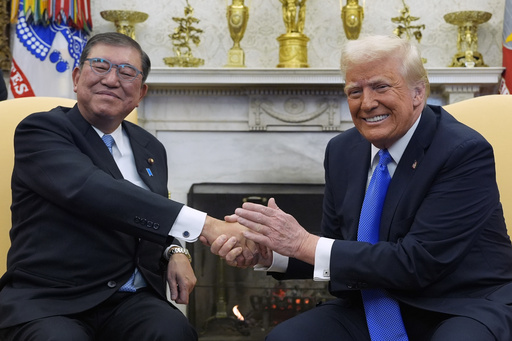
On Friday around midday, Japanese Prime Minister Shigeru Ishiba visited the White House, where he was anticipated to engage in a working lunch with President Trump followed by a joint press briefing. The entire meeting was expected to last a little over two hours before Ishiba headed back to Tokyo.
Simultaneously, a forced leave took effect for the majority of employees at the U.S. Agency for International Development (USAID). This situation arose as employee unions sought legal recourse to halt the Trump administration’s rapid dismantling of the decades-old agency and its global programs.
In recent highlights, Trump indicated that Nippon Steel has decided against purchasing U.S. Steel and will instead focus on investing in the company. While addressing the media alongside Prime Minister Ishiba, Trump mistakenly referred to Nippon Steel as “Nissan,” the well-known automobile manufacturer. Nevertheless, both Trump and President Biden had earlier committed to blocking Nippon Steel’s acquisition.
Trump mentioned he would meet with Nippon Steel’s head next week “to mediate and arbitrate,” further hinting at developments regarding potential investments in U.S. Steel.
In another announcement, Trump declared plans for reciprocal tariffs, stating, “I’ll be announcing that next week, reciprocal trade, so that we’re treated evenly with other countries,” during the meeting with Ishiba. This aligns with Trump’s long-standing pledge to impose tariffs matching those from trading nations that levy tariffs on American goods. However, he did not specify which nations might face these new tariffs.
Additionally, as he aims to collaborate with Japan on mitigating the U.S. trade deficit, currently estimated at around $68 billion, discussions surrounding trade policies continue to unfold.
In other matters involving the Trump administration, a recent directive from Sean Duffy emphasized redirecting transportation funds towards states with higher birth and marriage rates, a move some critics have labeled as biased towards Republican-leaning states. Duffy’s memo instructed that federal funding would favor these demographics, while also raising concerns among opponents about potential injustices against regions with lower birth rates.
Following the ongoing investigations into the January 6 Capitol attack, the Justice Department has agreed not to disclose the identities of certain FBI agents involved, as revealing such information might endanger their lives. This decision came after legal action was taken to prevent potential exposure.
Democratic lawmakers are now advocating for a Treasury Department investigation about the access Elon Musk’s company, DOGE, has to federal payment systems, expressing concerns regarding transparency and national security implications.
In the legal realm, a judge has scheduled hearings concerning lawsuits filed by USAID employees aimed at reversing the agency’s downsizing. The case follows actions taken by the Trump administration to significantly reduce agency staffing amidst critiques of potential negative impacts on American employees and global humanitarian efforts.
The White House has also mandated that federal agencies compile lists of employees with performance ratings below “fully successful” over recent years. This information is required as part of a broader initiative to assess workforce effectiveness.
In international engagements, President Trump mentioned he “probably” would meet with Ukrainian President Volodymyr Zelenskyy and may have discussions with Russian President Vladimir Putin as part of efforts to de-escalate conflicts in Ukraine.
Another noteworthy political and legal confrontation is emerging in Hungary, where Prime Minister Viktor Orbán has taken steps to eliminate NGOs and media that have received U.S. funding, framing the move as a response to what he sees as foreign interference.
Finally, amidst the broader implications of Trump’s presidency on the economy, new reports indicate that inflation concerns are weighing heavily on American consumers. Many are predicting worsening inflation conditions, posing a challenge for the administration, especially as it grapples with the potential fallout from new tariff implementations and trade confrontations. White House officials have attributed lingering economic uncertainties to the previous administration’s policies while pushing for renewed confidence in Trump’s economic agenda.

